Juho Pohjalainen's Blog: Pankarp - Posts Tagged "science"
Rule Number One of Magic: There Are No Rules
Or to be perhaps a little less blunt and poetic... the rules for magic come from within, not without.
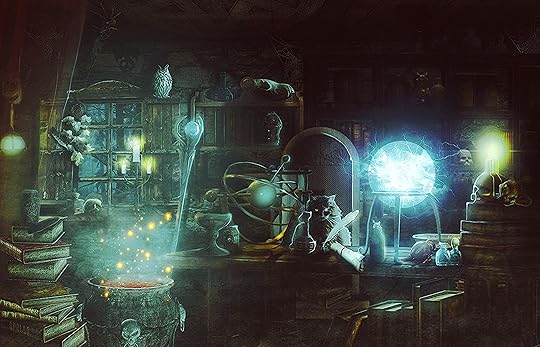
Great many fantasy writers, especially nowadays, love to develop complex magic systems, fancy and impressive and well-explained, spending a lot of time and pages to describe the way the wizard tosses the runestones or sings the song or speaks the true name or what have you. And I never saw the point in this sort of a thing: it may seem like an attractive course of action on the surface, to flesh out and expand the most magical and fantastic thing in your world, to show the reader just how things work there and how it's different from our own mundane life... but what you're really doing is, you're wasting a great deal of time and effort and the reader's attention to make your world less magical.
You're taking things that should be Unknown, and making them Known. You're turning the Magic into Science: the kind of science that's quite impossible for us in real life to do, but science nonetheless. From the narrative standpoint, what really is the difference between tapping into the energies of the Wyrd (or whatever) that exists parallel to your world and that all magic is fueled by, then wriggling your fingers the right way, snapping your thumb and forefinger to create the spark, in order to cast the Fireball spell to burn your enemies – and pulling the trigger of your flamethrower to shoot the fuel out through the burning nozzle?

There is no difference.
This was a fairly exaggerated example, many of the magic systems rarely true to such extent, but you get the point. Each fact established about magic as a whole – where the magical energy comes from, whether wizards throw down runes or play music or whatever to create effects with it, how different runes or instruments or what have you play off of one another, etc. – binds it more and more to common reality, dulls out the fantasy and wonder, makes it more logical and understandable and predictable, cages it. Magic should fly free.
So, I avoid making such generalizations to the last: I never tell how all magic everywhere works. Instead, I tell how this one guy's magic works. This has numerous advantages for me:
First, I tend to enjoy character-based stories, rather than setting-based, so this keeps the priorities in the correct order. To develop some character's inidividual magical style, is to develop the character.
Second, it maintains the sense of wonder. You may know how this guy works his magic, but you have no idea how the next guy does it: each time you meet another wizard you'll have something to look forward to.
Third, it still binds them to the narrative with personal rules and limitations. To take the above Fireball example, one wizard may cast it with a wand made out of specific kind of wood, with specific kind of runes written in it; another one might cast it by yelling out a Sick Burn. If you want to defend yourself against the former guy, or to add narrative tension about his survival, snap his wand; to do the same for the latter, gag him.
You see a demonstration of this early on in The Straggler's Mask, where two wizards take out their wands and commit to a terrible and destructive arcane duel. Their different philosophies and powers are at the forefront the entire time:

(Incidentally, I'm really not a fan of how so much of magic art is so full of flash and color and lightning and other special effects. But that's a blog post for another day.)
The old man Melker has spent all his long life in formal theoretical study of the arcane, learning his art slowly and methodically from scrolls, grimoires, and sorcerers even older and wiser than himself. A common magic system is to attribute magic to a language, but here we take this approach to the extreme: to such logical and methodical sorcerers, every individual spell is a language of their own. You don't just learn the language of magic in general. You learn the language of Fireball. And you better learn it well before starting to fling the spell around, or else you might embarrass yourself by casting something stupid, and you'll always have an accent no matter what you do. (Going with this method, Ziad Fazah would be a legendary archmage!) Melker may have only a few spells, but he's had a long time to become fluent with each of them, casting them with practiced and precise competence and surprising flexibility.
The demonic witch-girl Rime, on the other hand, has no patience for such bullshit, and instead learned her art from the lips of demons and spirits. Their whispers don't involve much about the nitty-gritty details of whatever spells they taught her, rather just how to get things done quickly and efficiently. She is consequently extremely powerful for her age, having learned a lot of things very fast... but not necessarily very well. Virtually all of her magic comes with a heavy cost, whether material or spiritual or physical, or risk doing great deal more harm to her surroundings than she'd wish it to, or involve constantly maintained pacts and complex diplomacy with summoned demons and monsters. She wields it all with relentless, burning rage – she is at a constant risk of being destroyed by things she doesn't understand, but she's going to take a chunk of the world with her.
And they are only two. You can bet that every other wizard in the setting will have their own way of doing things. None of them truly know where the magic comes from, if indeed it all comes from the same place at all – some of them have theories, beliefs, but I'll never make the mistake of telling you which one is right.
There is one constant rule, I suppose, but it's not really a rule with magic as with everything in this world or theirs: all knowledge or power worth possessing is going to take a great deal of effort, time, or other cost to acquire. If you feel that something came too easy for you, then odds are good you haven't truly acquired it, and that it's going to do you far more harm than good.
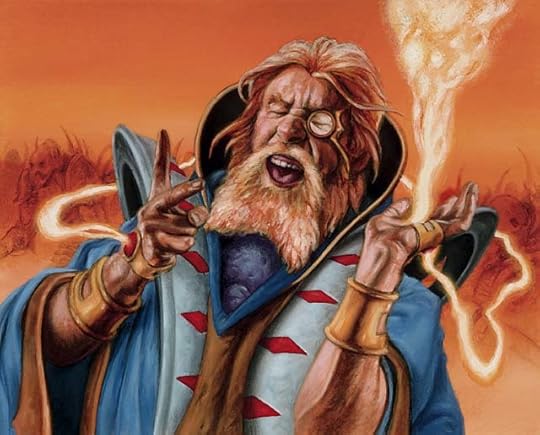

Great many fantasy writers, especially nowadays, love to develop complex magic systems, fancy and impressive and well-explained, spending a lot of time and pages to describe the way the wizard tosses the runestones or sings the song or speaks the true name or what have you. And I never saw the point in this sort of a thing: it may seem like an attractive course of action on the surface, to flesh out and expand the most magical and fantastic thing in your world, to show the reader just how things work there and how it's different from our own mundane life... but what you're really doing is, you're wasting a great deal of time and effort and the reader's attention to make your world less magical.
You're taking things that should be Unknown, and making them Known. You're turning the Magic into Science: the kind of science that's quite impossible for us in real life to do, but science nonetheless. From the narrative standpoint, what really is the difference between tapping into the energies of the Wyrd (or whatever) that exists parallel to your world and that all magic is fueled by, then wriggling your fingers the right way, snapping your thumb and forefinger to create the spark, in order to cast the Fireball spell to burn your enemies – and pulling the trigger of your flamethrower to shoot the fuel out through the burning nozzle?

There is no difference.
This was a fairly exaggerated example, many of the magic systems rarely true to such extent, but you get the point. Each fact established about magic as a whole – where the magical energy comes from, whether wizards throw down runes or play music or whatever to create effects with it, how different runes or instruments or what have you play off of one another, etc. – binds it more and more to common reality, dulls out the fantasy and wonder, makes it more logical and understandable and predictable, cages it. Magic should fly free.
So, I avoid making such generalizations to the last: I never tell how all magic everywhere works. Instead, I tell how this one guy's magic works. This has numerous advantages for me:
First, I tend to enjoy character-based stories, rather than setting-based, so this keeps the priorities in the correct order. To develop some character's inidividual magical style, is to develop the character.
Second, it maintains the sense of wonder. You may know how this guy works his magic, but you have no idea how the next guy does it: each time you meet another wizard you'll have something to look forward to.
Third, it still binds them to the narrative with personal rules and limitations. To take the above Fireball example, one wizard may cast it with a wand made out of specific kind of wood, with specific kind of runes written in it; another one might cast it by yelling out a Sick Burn. If you want to defend yourself against the former guy, or to add narrative tension about his survival, snap his wand; to do the same for the latter, gag him.
You see a demonstration of this early on in The Straggler's Mask, where two wizards take out their wands and commit to a terrible and destructive arcane duel. Their different philosophies and powers are at the forefront the entire time:

(Incidentally, I'm really not a fan of how so much of magic art is so full of flash and color and lightning and other special effects. But that's a blog post for another day.)
The old man Melker has spent all his long life in formal theoretical study of the arcane, learning his art slowly and methodically from scrolls, grimoires, and sorcerers even older and wiser than himself. A common magic system is to attribute magic to a language, but here we take this approach to the extreme: to such logical and methodical sorcerers, every individual spell is a language of their own. You don't just learn the language of magic in general. You learn the language of Fireball. And you better learn it well before starting to fling the spell around, or else you might embarrass yourself by casting something stupid, and you'll always have an accent no matter what you do. (Going with this method, Ziad Fazah would be a legendary archmage!) Melker may have only a few spells, but he's had a long time to become fluent with each of them, casting them with practiced and precise competence and surprising flexibility.
The demonic witch-girl Rime, on the other hand, has no patience for such bullshit, and instead learned her art from the lips of demons and spirits. Their whispers don't involve much about the nitty-gritty details of whatever spells they taught her, rather just how to get things done quickly and efficiently. She is consequently extremely powerful for her age, having learned a lot of things very fast... but not necessarily very well. Virtually all of her magic comes with a heavy cost, whether material or spiritual or physical, or risk doing great deal more harm to her surroundings than she'd wish it to, or involve constantly maintained pacts and complex diplomacy with summoned demons and monsters. She wields it all with relentless, burning rage – she is at a constant risk of being destroyed by things she doesn't understand, but she's going to take a chunk of the world with her.
And they are only two. You can bet that every other wizard in the setting will have their own way of doing things. None of them truly know where the magic comes from, if indeed it all comes from the same place at all – some of them have theories, beliefs, but I'll never make the mistake of telling you which one is right.
There is one constant rule, I suppose, but it's not really a rule with magic as with everything in this world or theirs: all knowledge or power worth possessing is going to take a great deal of effort, time, or other cost to acquire. If you feel that something came too easy for you, then odds are good you haven't truly acquired it, and that it's going to do you far more harm than good.

Published on June 08, 2019 16:22
•
Tags:
magic, magic-systems, melker, overdesigning, pet-peeves, rime, rules, science, wizards, worldbuilding
Rule Number Two of Magic: Plenty Magic, Few Wizards
A human mind has always longed to make sense of things - to understand, to quantify, and to bind and take advantage of... or to get rid of what cannot be understood, to destroy or subjugate that which we fear.

For the last generation or so, this sort of thinking has been in vogue in fantasy as well. We now have great many stories where magic is fully understood, wizardry is a common and accepted profession, and fantasy creatures and weird races walk among us; or where all that nonsense has been shunted aside in favour of gritty medieval realism. On the internet message boards - particularly Tumblr - people love to discuss magic and monsters and such things, wonder how exactly they work, seek out loopholes in their behavior and new strengths and weaknesses, or have a good laugh about what happens when their rules are applied to reality in new and ridiculous ways.
For example...
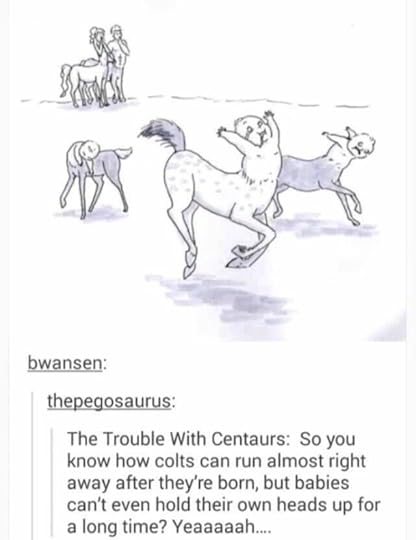
Even that last aspect, about destruction and domination, has found new life in a subgenre called HFY - short for "Humanity Fuck Yeah" - which started out as an attempt to give humans something to be special about in the face of all the aliens and monsters, rather than being the generic Normals, but which many have chosen to interpret as humanity applying their science, intellect, and combat instinct to destroy all the fantastic and weird.

It's not just a yearning to understand, really - it all works in concert with an almost-equal yearning to explain. To show off, to feel smarter than those around us. To describe in great detail how our magic systems work, how well they make sense, and how we've integrated other creatures and monsters and races into the world and how they would change things in society; or, at the opposite end, how much research we've done on the subject of medieval history, technology, sociology, heraldry, and mud. Hell, I myself am far from immune to this: I make one atypical cosmic system and ensuing seasons and weather patterns, and I now find myself wanting to talk about it in every story I write.
I think it all shows an even greater issue we as a species have: when we get an idea that's ostensibly good or beneficial or funny, we exploit the shit out of it. More often than not this results in far more trouble than its worth. We cannot do anything in moderation. As seen here: we want to make sense of stuff, and so we kill fantasy.
Well, it's a slight exaggeration. It's not to say that any such fiction could not be pretty great anyway, or that some of the internet fantasy analyzation isn't really funny and making some curious remarks - it's just that I don't think we should follow such a trend too far, as a general rule, and that we should give a new chance to not understanding everything, and to let the world's own strange logic to carry things for us.
So as I like to do things, there's a lot of magic out there, a lot of fantasy, a lot of mystery - and there's nothing you understand about it on the outset, and very little you understand even after you've had an adventure. Wizards are rare and few, considered powerful and sagacious even when they're relatively weak or ignorant by the standards of most fantasy - each as well-known as kings, and no more common, yet each has only ever glimpsed a little bit of the unknown realm of fantasy. Other races live far away from human realms, at best mysterious and detached in the borderlands where they're sometimes seen, at worst unseen and wondrous, relegated to realm of imagination and fairytale, in the inner lands. The very world, its lands and seas and skies, acts bizarrely and erratically, all too often impossible to predict or defend against, let alone control. The people who have gone to these lands of wonder and returned alive, are venerated by all.
In your little farm, village, or town, things may - indeed should - seem altogether normal and sensible, your immediate surroundings well understood to you and no longer causing you fear... but step out of your door and onto the forest path, and who knows where it will take you and what strange sights will open to you.
That, as I understand it, is Fantasy.
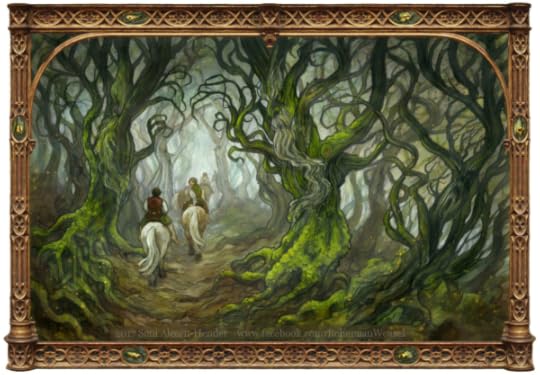

For the last generation or so, this sort of thinking has been in vogue in fantasy as well. We now have great many stories where magic is fully understood, wizardry is a common and accepted profession, and fantasy creatures and weird races walk among us; or where all that nonsense has been shunted aside in favour of gritty medieval realism. On the internet message boards - particularly Tumblr - people love to discuss magic and monsters and such things, wonder how exactly they work, seek out loopholes in their behavior and new strengths and weaknesses, or have a good laugh about what happens when their rules are applied to reality in new and ridiculous ways.
For example...

Even that last aspect, about destruction and domination, has found new life in a subgenre called HFY - short for "Humanity Fuck Yeah" - which started out as an attempt to give humans something to be special about in the face of all the aliens and monsters, rather than being the generic Normals, but which many have chosen to interpret as humanity applying their science, intellect, and combat instinct to destroy all the fantastic and weird.

It's not just a yearning to understand, really - it all works in concert with an almost-equal yearning to explain. To show off, to feel smarter than those around us. To describe in great detail how our magic systems work, how well they make sense, and how we've integrated other creatures and monsters and races into the world and how they would change things in society; or, at the opposite end, how much research we've done on the subject of medieval history, technology, sociology, heraldry, and mud. Hell, I myself am far from immune to this: I make one atypical cosmic system and ensuing seasons and weather patterns, and I now find myself wanting to talk about it in every story I write.
I think it all shows an even greater issue we as a species have: when we get an idea that's ostensibly good or beneficial or funny, we exploit the shit out of it. More often than not this results in far more trouble than its worth. We cannot do anything in moderation. As seen here: we want to make sense of stuff, and so we kill fantasy.
Well, it's a slight exaggeration. It's not to say that any such fiction could not be pretty great anyway, or that some of the internet fantasy analyzation isn't really funny and making some curious remarks - it's just that I don't think we should follow such a trend too far, as a general rule, and that we should give a new chance to not understanding everything, and to let the world's own strange logic to carry things for us.
So as I like to do things, there's a lot of magic out there, a lot of fantasy, a lot of mystery - and there's nothing you understand about it on the outset, and very little you understand even after you've had an adventure. Wizards are rare and few, considered powerful and sagacious even when they're relatively weak or ignorant by the standards of most fantasy - each as well-known as kings, and no more common, yet each has only ever glimpsed a little bit of the unknown realm of fantasy. Other races live far away from human realms, at best mysterious and detached in the borderlands where they're sometimes seen, at worst unseen and wondrous, relegated to realm of imagination and fairytale, in the inner lands. The very world, its lands and seas and skies, acts bizarrely and erratically, all too often impossible to predict or defend against, let alone control. The people who have gone to these lands of wonder and returned alive, are venerated by all.
In your little farm, village, or town, things may - indeed should - seem altogether normal and sensible, your immediate surroundings well understood to you and no longer causing you fear... but step out of your door and onto the forest path, and who knows where it will take you and what strange sights will open to you.
That, as I understand it, is Fantasy.

Published on June 20, 2019 10:07
•
Tags:
creatures, fairy-tales, fantasy, humanity, instinct, magic, magic-systems, pet-peeves, rules, science, wizards, worldbuilding
Race and Race - Scattered Thoughts on Brown Elves
I'm sure we all have our own opinions on the new Rings of Power stuff presented to us recently. We've had a lot to talk about. Many things we feel strongly about. To me it's giving plenty food for thought in regards of setting and worldbuilding, and nonhuman races, and how far they reach and where you might find them.
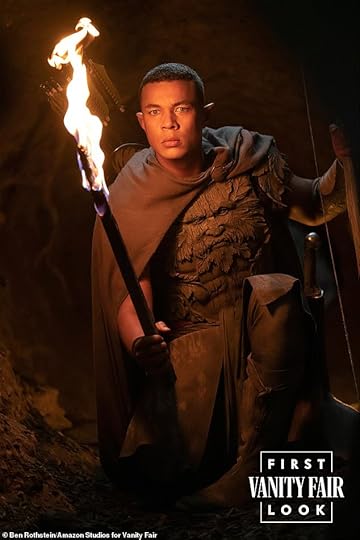
So what's with this guy? Where'd he come from, in the grand worldly scheme of things? I'm guessing Near Harad, is where him or his parents or grandparents originate: he doesn't seem quite dark-complexioned enough to have his origins in Far Harad or beyond, though I might be wrong.
After the Awakening of Elves, far in the Years of the Trees, they of course split up with some choosing to follow Oromë into Valinor, and others opting to remain behind in the land of starlight. Others still were caught by Melkor and ended up twisted into orcs. But suppose that doesn't account for all of them?
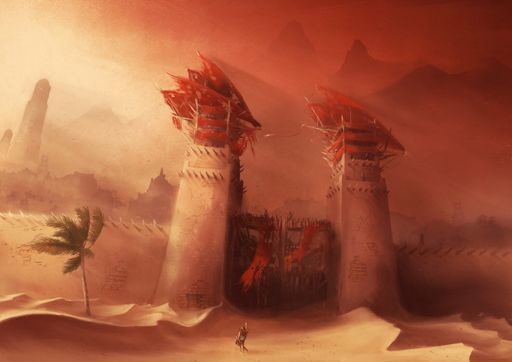
Suppose some of them - such as Arondir's ancestors - wandered south instead, to the lands of vast prairies and hot sun and bloody hugeass elephants, and here they made themselves a home? And over time, they began to adjust to the new environment, same as migrating humans adjusted to theirs? (Although in the real world it was rather the opposite, since we came from the south rather than going there, but you get what I mean.)
And I'm not just talking about Middle-Earth here. More generally, you can apply the same line of thought to just about any fantasy setting. Humans in these worlds have migrated all across the globe, so why not elves as well? Or dwarves, or halflings, or even orcs? Spread out in prehistory, filled the earth, and diverged a little bit? And there, you've got your new fantasy setting all covered!
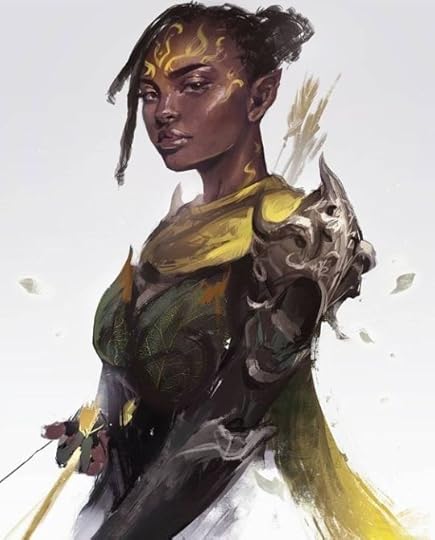
Trouble is, fantasy typically doesn't operate on long enough timeframes for this diversity to kick in. You've got your Mythic Ages and Golden Ages, your Ancient Empires, all having taken place thousands or at most tens of thousands of years ago. It took longer than that for the current major racial groups to form - and elves and dwarves, with their significantly greater lifespans, would take a longer time still. And it'd raise further questions about going backwards along the line: not about how they formed the way they did, but where did elves and dwarves come from in the first place? How did they evolve, differ from humanity? Or did humanity differ from them? And what could have prompted the outrageously varying lifespans?
Or maybe they're aliens? Visitors from space, that landed here (or crash-landed) eons ago when ancestors of man still lived in trees. The different ethnicities could have come from different ships, different areas from their old homeworld, explaining their differences... or they might have had the time to evolve and diversify in their new home, before the present day. And the orcs were of course an ancient bioweapon that got loose and made a mess of the local ecosystem.
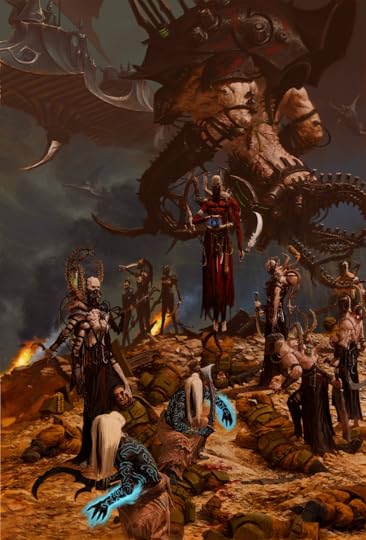
We've drifted pretty deep in the realm of science fiction now. That's not necessarily a bad thing - I like to mix the two a lot myself - but I get the feeling it's not what Tolkien was going for. So let's wind back a little and look at this whole thing from a mythological standpoint.
Creation myths! Divine meddling upon a virgin earth! Forming this ball out of a bunch of space-stones, then seeding the planet with all varieties of life! (They might even be aliens themselves, masters of genetic engineering, but that's going back to scifi so I'mma stop here.) Elves usually came first out of the oven, shortly before or after things such as dragons and serpentmen and other weirder things, followed by dwarves, then finally men.
And why would these gods stick to just one geographical location? And as they spread around, why wouldn't they experiment a little bit, tweak their core design to better suit the environment they stick them in? Pale elves up north, dark elves in the south to the realm of high burning sun, for instance. That'd work out just fine, wouldn't it?
But think of it... these other realms, other kingdoms and continents, would have their own myths. Their own gods and heroes, their own strange nonhuman beings lurking in the fringes of the earth. In the east, the Yokai. In the far south, the Tikoloshe or Hili. Just to name a couple examples. Elves, dwarves, and the gods that created them, hold dominion just over the relatively small land of Europe. To spread farther than that, they'd have to...

Just try and imagine it - conquering pantheon emerges on the shores, exterminates the local gods, puts to torch their worshipers, smashes their idols, then in the place of all these things spreads out their own creatures, just ever so slightly changed for the sake of diversity... when in truth, what they're doing is homogenizing things. Make it all look the exact same, just with different amounts of skin pigmentation. One myth to rule them all. All of a sudden it sounds pretty ugly.
Mind you, you could do a lot with that idea. A great epic divine war, the gods of one realm seeking to invade another. Or if you don't feel like it, then you might want to think about diversifying in the other direction: if you bring elves to the jungles of the Darkest Africa, then some of those jungle creatures might end up moving to the cold north. Sort of a great fantasy cultural exchange program. But I'm not sure I like that idea very much: it makes all of the realms look less unique, more of the same, the same way in the real world all the nations have started to blend together into one big capitalistic mass of grey towers and fast food joints.

No, I think I'd much rather keep things as different as possible. It's fantasy, after all: filled with strange alien realms where few people have gone and where nothing is the same, and with all manner of creatures living in the deep woods and dark caves and desolate mountaintops. Always keep things fantastic. Always keep things different. Instead of spreading out elves everywhere, look into the myths and tales of these other cultures, and tap from those. You'll get so much more out of your tales that way, I think.
But perhaps there's one last explanation - one final way to make everything work. Perhaps Eru Illúvatar simply likes to play with colors. He's put a few brown elves and black dwarves here and there, purely for the sake of variety. And if this were the case, then I must ask...

Where are the Pink Elves?

So what's with this guy? Where'd he come from, in the grand worldly scheme of things? I'm guessing Near Harad, is where him or his parents or grandparents originate: he doesn't seem quite dark-complexioned enough to have his origins in Far Harad or beyond, though I might be wrong.
After the Awakening of Elves, far in the Years of the Trees, they of course split up with some choosing to follow Oromë into Valinor, and others opting to remain behind in the land of starlight. Others still were caught by Melkor and ended up twisted into orcs. But suppose that doesn't account for all of them?

Suppose some of them - such as Arondir's ancestors - wandered south instead, to the lands of vast prairies and hot sun and bloody hugeass elephants, and here they made themselves a home? And over time, they began to adjust to the new environment, same as migrating humans adjusted to theirs? (Although in the real world it was rather the opposite, since we came from the south rather than going there, but you get what I mean.)
And I'm not just talking about Middle-Earth here. More generally, you can apply the same line of thought to just about any fantasy setting. Humans in these worlds have migrated all across the globe, so why not elves as well? Or dwarves, or halflings, or even orcs? Spread out in prehistory, filled the earth, and diverged a little bit? And there, you've got your new fantasy setting all covered!

Trouble is, fantasy typically doesn't operate on long enough timeframes for this diversity to kick in. You've got your Mythic Ages and Golden Ages, your Ancient Empires, all having taken place thousands or at most tens of thousands of years ago. It took longer than that for the current major racial groups to form - and elves and dwarves, with their significantly greater lifespans, would take a longer time still. And it'd raise further questions about going backwards along the line: not about how they formed the way they did, but where did elves and dwarves come from in the first place? How did they evolve, differ from humanity? Or did humanity differ from them? And what could have prompted the outrageously varying lifespans?
Or maybe they're aliens? Visitors from space, that landed here (or crash-landed) eons ago when ancestors of man still lived in trees. The different ethnicities could have come from different ships, different areas from their old homeworld, explaining their differences... or they might have had the time to evolve and diversify in their new home, before the present day. And the orcs were of course an ancient bioweapon that got loose and made a mess of the local ecosystem.

We've drifted pretty deep in the realm of science fiction now. That's not necessarily a bad thing - I like to mix the two a lot myself - but I get the feeling it's not what Tolkien was going for. So let's wind back a little and look at this whole thing from a mythological standpoint.
Creation myths! Divine meddling upon a virgin earth! Forming this ball out of a bunch of space-stones, then seeding the planet with all varieties of life! (They might even be aliens themselves, masters of genetic engineering, but that's going back to scifi so I'mma stop here.) Elves usually came first out of the oven, shortly before or after things such as dragons and serpentmen and other weirder things, followed by dwarves, then finally men.
And why would these gods stick to just one geographical location? And as they spread around, why wouldn't they experiment a little bit, tweak their core design to better suit the environment they stick them in? Pale elves up north, dark elves in the south to the realm of high burning sun, for instance. That'd work out just fine, wouldn't it?
But think of it... these other realms, other kingdoms and continents, would have their own myths. Their own gods and heroes, their own strange nonhuman beings lurking in the fringes of the earth. In the east, the Yokai. In the far south, the Tikoloshe or Hili. Just to name a couple examples. Elves, dwarves, and the gods that created them, hold dominion just over the relatively small land of Europe. To spread farther than that, they'd have to...

Just try and imagine it - conquering pantheon emerges on the shores, exterminates the local gods, puts to torch their worshipers, smashes their idols, then in the place of all these things spreads out their own creatures, just ever so slightly changed for the sake of diversity... when in truth, what they're doing is homogenizing things. Make it all look the exact same, just with different amounts of skin pigmentation. One myth to rule them all. All of a sudden it sounds pretty ugly.
Mind you, you could do a lot with that idea. A great epic divine war, the gods of one realm seeking to invade another. Or if you don't feel like it, then you might want to think about diversifying in the other direction: if you bring elves to the jungles of the Darkest Africa, then some of those jungle creatures might end up moving to the cold north. Sort of a great fantasy cultural exchange program. But I'm not sure I like that idea very much: it makes all of the realms look less unique, more of the same, the same way in the real world all the nations have started to blend together into one big capitalistic mass of grey towers and fast food joints.

No, I think I'd much rather keep things as different as possible. It's fantasy, after all: filled with strange alien realms where few people have gone and where nothing is the same, and with all manner of creatures living in the deep woods and dark caves and desolate mountaintops. Always keep things fantastic. Always keep things different. Instead of spreading out elves everywhere, look into the myths and tales of these other cultures, and tap from those. You'll get so much more out of your tales that way, I think.
But perhaps there's one last explanation - one final way to make everything work. Perhaps Eru Illúvatar simply likes to play with colors. He's put a few brown elves and black dwarves here and there, purely for the sake of variety. And if this were the case, then I must ask...

Where are the Pink Elves?
Ye Olde Useless Magick
Imagine questing for an ancient spell of awesome power, overcoming many dangerous trials and perils, one of your friends even sacrificing his life to break the seal. Then at last you get to whip out this planet-buster against the Dark Lord. And you find that it has all the power of a wet fart.
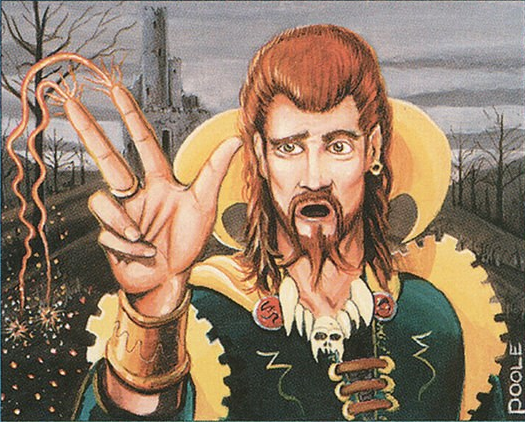
This is the predicament that the players of the 1988 Final Fantasy II found themselves in. The fabled Ultima spell, sealed away in the ancient days for its world-shattering potential, turned out to be effectively useless. Even the Emperor's mooks could pretty safely survive even a higher-level blast. The whole plotline was dropped just about as you learned the spell, and you never once need to actually cast it. Poor Minwu died for naught.
Allegedly we have one of the programmers to thank for this: he figured that such an old and outdated spell simply could not stand relevant in the face of newer and more refined techniques. That magic would naturally have advanced leaps and bounds in the many ages since Ultima had ruled the earth, and that even a simple fire spell, taken for granted by young wizards of today, could match or even overshadow it. Imagine Greek Fire, a deadly secret weapon of antiquity, pitted against modern bomber plane with a cargo hold full of napalm. You can't really argue with that.
Yet argue with it I shall!
Yes, cars get faster and safer, life-saving medicine more reliable, and communication devices more sophisticated. Technology improves. Science marches on. Problem is, as me and many others have elsewhere argued, magic is not science. It's pretty much the polar opposite of technology. Magic is art. And with art, I'm sad to say that these past few decades, if anything, we've regressed.
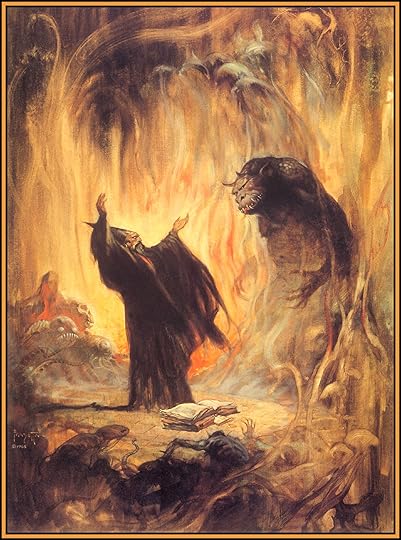
Art is hard work. Blood and sweat and tears. Cunning and problem-solving. Focus and desire. Patience and sacrifice. Whatever your canvas - paper, notepad, piece of code, circle of summoning, artifact of doom - you're pouring your soul onto it for all to see. Your anger and frustration, your depression and self-doubts, it's all fuel in the fires of creation. You rack your brain to figure out how it all comes together, and get real inventive to pull off things no one else ever has. You need to be conservative with what you put in, and lean into your limitations, turn them into advantages.
You wouldn't even have started if you didn't think it would be worth it. You won't ever give up until it's perfect and just right. Every hardship you face, every hurdle, even the tiniest of chores and errands and maintenance, only serves to fuel your determination and conviction and keep you focused on the task. And the harder the road, the more rewarding it is when you reach the end - the greater the end result, and the greater the lessons you've learned of your craft, of life, of yourself.
And technology gets in the way of that. It makes things easier, and this is one place in the world where this should not happen. It's like putting an escalator up a tall mountain road. Sure, the view's still great, but it doesn't feel the same way. You don't feel any ache or pain and your muscles didn't grow at all. It's not an adventure anymore, you could've just gone up there on a whim.
True enough, typing up a whole book is still pretty tough, even on a computer. There's still effort and great lessons and the beautiful sense of accomplishment, none of that has gone anywhere. Even to this day, great fantasies and biographies let us marvel the souls and blood of their authors.
 ut how's your handwriting doing? Wouldn't it just look so much grander with your own personal style of calligraphy and fancy medieval illuminations? Can you manage anything better than chicken-scratches now, since our whole society, including the work of art, gives no incentive to do such things anymore? And if you had a story in mind that truly deserved such attention - one you wanted to go the extra mile for - just what kind of an amazing fantasy would it have to be?
ut how's your handwriting doing? Wouldn't it just look so much grander with your own personal style of calligraphy and fancy medieval illuminations? Can you manage anything better than chicken-scratches now, since our whole society, including the work of art, gives no incentive to do such things anymore? And if you had a story in mind that truly deserved such attention - one you wanted to go the extra mile for - just what kind of an amazing fantasy would it have to be?
It's the same story all over. There's a reason most of us prefer practical effects over CGI, real costumes and camera tricks and big-ass model castles; a reason the first Jaws movie was a classic, the shoddy and uncooperative shark prop turned into a great advantage, when in the modern day that'd have thrown the big computer-monster front and center in every shot and ruined the whole thing. Even the new Puss In Boots movie, beautiful as it is, obvious as it is that its creators cared and put their heart into it and came up with all these new effects and tricks, it still can't hold a candle to AKIRA that came out decades in the past. And the modern plague of noodle-handed bean-mouths, cheap and simple to do, are widely and justly mocked.
And now the AI. Now at last, with the arrival of the great apocalyptic beasts GPT and Midjourney, all effort can be excised. All thought can be put away, all cunning snuffed out, all uniqueness made cheaply available everywhere, all meaning lost. I envision a dark age for all art unlike any we've seen ever before, even in the days of Comics Code.

Where was I? Oh, right, magic.
Yeah, I could see magic work about the same way. Over the generations - centuries, millennia - inventive and pioneering sorcerers would refine the spellcraft, make it easier to handle, cheaper to cast, quicker, more manageable, more potent. They'd learn new techniques, delve in new dimensions, uncover new realms. Write down names of new and more powerful cosmic entities. Promise their souls to stronger gods. Craft more sophisticated artifacts and channelling tools. Brew stronger potions. You get the idea. They might never truly tame the stuff - never get to the realm of the much-maligned Magic Systems - but they'll hone their craft to such efficiency as it is possible.
Before long even children can learn simple spells, and cast fireworks without risking to blow up their heads in the backlash. Perhaps not quite everyone can learn it, now or ever, but still, it'll seep into every aspect of this magical society.
The old ways are forgotten. Who, in this day and age, would ever bother spending all night dancing under the full moon? Who would want to risk an explosive miscast, when we can now avoid such things? Why would you still beseech this god, when it's known its power in our world is almost lost? Are you really crafting your own wand?
But this is magic. The realm of mystery and wonder, of fantasy and terrible, terrible might. Not all that is lost is worthless; not all that is outdated is entirely without power. And the more careful you need to be with it, the more preparations and precautions you need, the more it will teach you in turn. And if you're so absolutely convinced that you have to eschew the new and more reliable methods in favour of the old stuff, if you must risk your life in a way no wizard in ages has had to, if you must have your own meticulously handcrafted wand, if you must spend all night out in the cold, if you must go the hard way, tread a thorny path thought cleared millennia ago... well, then you probably have a damned good reason for it, and I'm not going to argue with that. Instead, I think I'll run the hell away.
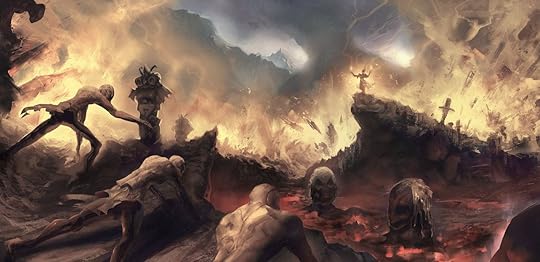
All these weak-ass ponce conjurers, when they see an old madman begin dance the old dance, they better hit the deck. Shit is about to get real.

This is the predicament that the players of the 1988 Final Fantasy II found themselves in. The fabled Ultima spell, sealed away in the ancient days for its world-shattering potential, turned out to be effectively useless. Even the Emperor's mooks could pretty safely survive even a higher-level blast. The whole plotline was dropped just about as you learned the spell, and you never once need to actually cast it. Poor Minwu died for naught.
Allegedly we have one of the programmers to thank for this: he figured that such an old and outdated spell simply could not stand relevant in the face of newer and more refined techniques. That magic would naturally have advanced leaps and bounds in the many ages since Ultima had ruled the earth, and that even a simple fire spell, taken for granted by young wizards of today, could match or even overshadow it. Imagine Greek Fire, a deadly secret weapon of antiquity, pitted against modern bomber plane with a cargo hold full of napalm. You can't really argue with that.
Yet argue with it I shall!
Yes, cars get faster and safer, life-saving medicine more reliable, and communication devices more sophisticated. Technology improves. Science marches on. Problem is, as me and many others have elsewhere argued, magic is not science. It's pretty much the polar opposite of technology. Magic is art. And with art, I'm sad to say that these past few decades, if anything, we've regressed.

Art is hard work. Blood and sweat and tears. Cunning and problem-solving. Focus and desire. Patience and sacrifice. Whatever your canvas - paper, notepad, piece of code, circle of summoning, artifact of doom - you're pouring your soul onto it for all to see. Your anger and frustration, your depression and self-doubts, it's all fuel in the fires of creation. You rack your brain to figure out how it all comes together, and get real inventive to pull off things no one else ever has. You need to be conservative with what you put in, and lean into your limitations, turn them into advantages.
You wouldn't even have started if you didn't think it would be worth it. You won't ever give up until it's perfect and just right. Every hardship you face, every hurdle, even the tiniest of chores and errands and maintenance, only serves to fuel your determination and conviction and keep you focused on the task. And the harder the road, the more rewarding it is when you reach the end - the greater the end result, and the greater the lessons you've learned of your craft, of life, of yourself.
And technology gets in the way of that. It makes things easier, and this is one place in the world where this should not happen. It's like putting an escalator up a tall mountain road. Sure, the view's still great, but it doesn't feel the same way. You don't feel any ache or pain and your muscles didn't grow at all. It's not an adventure anymore, you could've just gone up there on a whim.
True enough, typing up a whole book is still pretty tough, even on a computer. There's still effort and great lessons and the beautiful sense of accomplishment, none of that has gone anywhere. Even to this day, great fantasies and biographies let us marvel the souls and blood of their authors.
 ut how's your handwriting doing? Wouldn't it just look so much grander with your own personal style of calligraphy and fancy medieval illuminations? Can you manage anything better than chicken-scratches now, since our whole society, including the work of art, gives no incentive to do such things anymore? And if you had a story in mind that truly deserved such attention - one you wanted to go the extra mile for - just what kind of an amazing fantasy would it have to be?
ut how's your handwriting doing? Wouldn't it just look so much grander with your own personal style of calligraphy and fancy medieval illuminations? Can you manage anything better than chicken-scratches now, since our whole society, including the work of art, gives no incentive to do such things anymore? And if you had a story in mind that truly deserved such attention - one you wanted to go the extra mile for - just what kind of an amazing fantasy would it have to be?It's the same story all over. There's a reason most of us prefer practical effects over CGI, real costumes and camera tricks and big-ass model castles; a reason the first Jaws movie was a classic, the shoddy and uncooperative shark prop turned into a great advantage, when in the modern day that'd have thrown the big computer-monster front and center in every shot and ruined the whole thing. Even the new Puss In Boots movie, beautiful as it is, obvious as it is that its creators cared and put their heart into it and came up with all these new effects and tricks, it still can't hold a candle to AKIRA that came out decades in the past. And the modern plague of noodle-handed bean-mouths, cheap and simple to do, are widely and justly mocked.
And now the AI. Now at last, with the arrival of the great apocalyptic beasts GPT and Midjourney, all effort can be excised. All thought can be put away, all cunning snuffed out, all uniqueness made cheaply available everywhere, all meaning lost. I envision a dark age for all art unlike any we've seen ever before, even in the days of Comics Code.

Where was I? Oh, right, magic.
Yeah, I could see magic work about the same way. Over the generations - centuries, millennia - inventive and pioneering sorcerers would refine the spellcraft, make it easier to handle, cheaper to cast, quicker, more manageable, more potent. They'd learn new techniques, delve in new dimensions, uncover new realms. Write down names of new and more powerful cosmic entities. Promise their souls to stronger gods. Craft more sophisticated artifacts and channelling tools. Brew stronger potions. You get the idea. They might never truly tame the stuff - never get to the realm of the much-maligned Magic Systems - but they'll hone their craft to such efficiency as it is possible.
Before long even children can learn simple spells, and cast fireworks without risking to blow up their heads in the backlash. Perhaps not quite everyone can learn it, now or ever, but still, it'll seep into every aspect of this magical society.
The old ways are forgotten. Who, in this day and age, would ever bother spending all night dancing under the full moon? Who would want to risk an explosive miscast, when we can now avoid such things? Why would you still beseech this god, when it's known its power in our world is almost lost? Are you really crafting your own wand?
But this is magic. The realm of mystery and wonder, of fantasy and terrible, terrible might. Not all that is lost is worthless; not all that is outdated is entirely without power. And the more careful you need to be with it, the more preparations and precautions you need, the more it will teach you in turn. And if you're so absolutely convinced that you have to eschew the new and more reliable methods in favour of the old stuff, if you must risk your life in a way no wizard in ages has had to, if you must have your own meticulously handcrafted wand, if you must spend all night out in the cold, if you must go the hard way, tread a thorny path thought cleared millennia ago... well, then you probably have a damned good reason for it, and I'm not going to argue with that. Instead, I think I'll run the hell away.

All these weak-ass ponce conjurers, when they see an old madman begin dance the old dance, they better hit the deck. Shit is about to get real.
Published on July 07, 2023 13:19
•
Tags:
ai, art, forgotten, magic, magic-systems, outdated, progress, science, technology
Pankarp
Pages fallen out of Straggler's journal, and others.
Pages fallen out of Straggler's journal, and others.
...more
- Juho Pohjalainen's profile
- 349 followers



